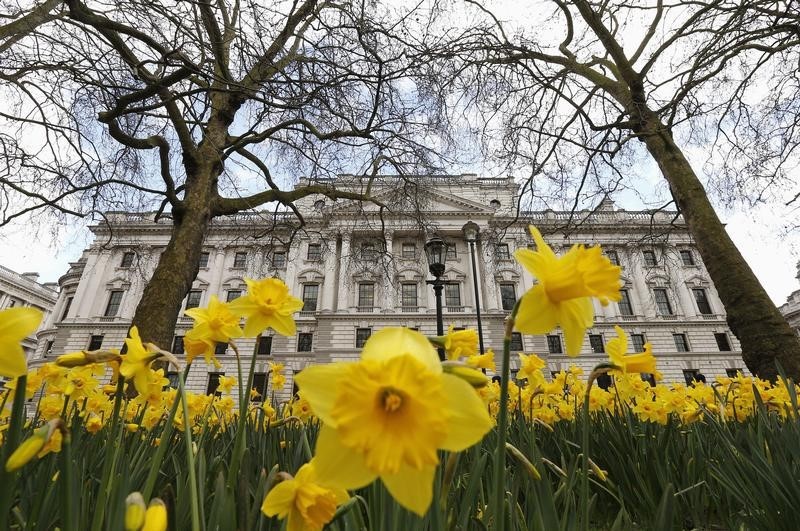LONDON (Reuters) - British government borrowing rose sharply in December due to unusually high European Union budget contributions falling due, though there were more encouraging signs of growth in income tax receipts.
Britain's headline public borrowing increased to 13.1 billion pounds from 10.3 billion pounds in December 2013, largely reflecting 2.9 billion pounds of payments to the EU, far more than normal due to a recalculation of Britain's contribution.
For the first nine months of the 2014/15 tax year, borrowing was just a fraction lower than in 2013/14 at 86.3 billion pounds, a similar year on year change to that reported in November.
Economists polled by Reuters had on average forecast December borrowing would drop to 9.7 billion pounds on the new measure of public sector net borrowing, excluding banks, which is used for government forecasts.
Deficit reduction has been the central economic policy of Britain's Conservative-led coalition since it came to power in 2010, and is one of the main issues on which finance minister George Osborne is campaigning ahead of May's national election.
However weak economic growth in 2011 and 2012, mean that Osborne has repeatedly had to scale back his deficit reduction plans, including as recently as December following a failure of tax revenues to rise in line with strong economic growth.
Thursday's figures suggest that even these new targets may be hard to achieve with just three months to go before the end of the tax year in March, though January and February typically bring much higher than normal income tax receipts.
There were some encouraging signs on this front in December, when receipts from income tax and capital gains tax rose by 3.1 percent compared with a year earlier, the strongest December increase since 2010.
But December's budget forecasts -- which took into account the expected larger-than-normal EU payment -- envisaged 2014/15 borrowing falling by 6 percent to 91.3 billion pounds, equivalent to 5.1 percent of gross domestic product (GDP).
This compares with Osborne's plan in March to reduce borrowing by around 12 percent.
Osborne has said that if the Conservatives return to government after May's election, he wants to run an outright budget surplus, something that will require significant further cuts to public spending.
The opposition Labour Party has a less ambitious goal which allows money to be borrowed to fund long-term investment.
Britain's budget deficit stood at 10 percent of GDP in 2009/10, just before Osborne became finance minister, and public sector net debt hit a record 80.9 percent of GDP in December.
December's EU budget contribution has also been a subject of hot political debate. The EU said earlier that year that statistical revisions which increased the size of Britain's economy compared to other EU members' meant that extra back payments were due on Dec. 1.
Osborne negotiated to defer the actual payments until 2015, and to bring forward related rebates, which he said saved several hundred million pounds, though both Labour and Conservative lawmakers disputed this.
Britain's national accounting rules mean that the full payment liability is charged to December's public borrowing, while the rebates will only be credited later. OLGBBUS Reuters UK Online Report Business News 20150122T095504+0000
